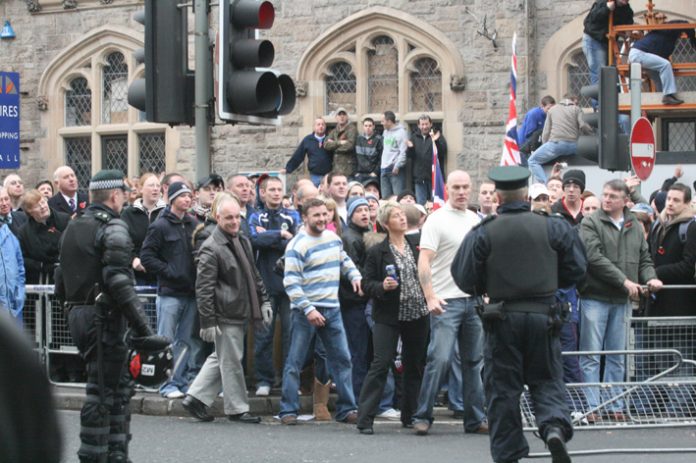BY JOHN COULTER, IRISH POLITICAL JOURNALIST
Sinn Féin and families of the victims of British state violence, yesterday held their rally in opposition to the British army’s military parade through Belfast city centre.
Both sides in the dispute avoided a serious confrontation when Sinn Féin changed the route of its protest and the British army cancelled a military fly-past.
There had been fears dissident republicans opposed to the peace process and English fascists might try to use the Home Coming parade and counter demonstration as an excuse to start riots.
However, both the main parade and Sinn Féin demonstration passed off without any serious incidents.
At the mainstream republican rally held in Dunville Park, Belfast, Sinn Féin’s North Belfast MLA and Stormont Junior Minister Gerry Kelly, as well as Mark Thompson from Relatives for Justice, spoke to the assembled crowd.
Almost 3,000 demonstrators marched down the Grosvenor Road to the protest line at Fisherwick Place.
Speaking after the event, Junior Minister Kelly said: ‘The families of victims of state violence and Sinn Féin committed ourselves to holding a solemn, peaceful and dignified protest rally. That’s exactly what was delivered today.
‘We have always made it clear that the singular focus of our protest was the British military parade, and highlighting the plight of those families bereaved as a result of collusion and state violence.
‘The British state policy of collusion is an issue that the British government and their armed apparatus cannot hide from, and the massive demonstration held today highlights this fact.
‘What the British army has done in Ireland is wrong and the same wrong is being inflicted on the people of Iraq and Afghanistan today.
‘I want to commend all of those who took part in our rally and who acted in such an appropriate and dignified way, despite enormous provocation.
‘The conduct of our families and protestors stands in marked contrast to the sectarian and violent reaction of those who claimed to be on the streets today to welcome home the British Army.
‘The onus is now on those public figures who called people out onto the streets in opposition to our protest to account for the unbridled sectarian behaviour witnessed in Belfast today.’
Over the weekend, two other Army Home Coming parades in the mainly Unionist Co Antrim towns of Ballymena and Larne passed off without trouble.
The Belfast Home Coming parade controversy had threatened to further de-stabilise the already fragile peace process in the north of Ireland as the Stormont Executive has not met for over four months – and this in spite of the current credit crunch and economic recession.
Political confrontations between the two communities over the Home Coming parades in general had also threatened the apparent warming of relations between Irish nationalists and the British army over honouring Irish-born soldiers who fought for Britain in the two world wars.
November 11th will see the 90th anniversary of the Armistice which brought the Great War to an end in 1918.
But it has only been in recent years that the Republic of Ireland has staged open commemoration services to honour Irish-born citizens who fought and died for Britain.
There has also been a campaign to honour Irish-born soldiers buried in the Republic who fought for Britain in other wars, such as the Crimean conflict.
This has been allied to a campaign to have special headstone commemorations to Irish-born recipients of the Victoria Cross, Britain’s highest medal for bravery. Many are buried in unmarked graves in the Republic.
Earlier this year, campaigners won a concession from the British government of a posthumous pardon for 26 Irish-born soldiers executed by Britain’s firing squads during the Great War for alleged desertion and cowardice.
It is believed these soldiers – known as the Shot At Dawn victims – had been suffering from ‘shell shock’.
During the Great War, British commanders were known to have ordered the executions of more than 300 ‘shelled shocked’ troops from Britain, Ireland and the Commonwealth nations.
